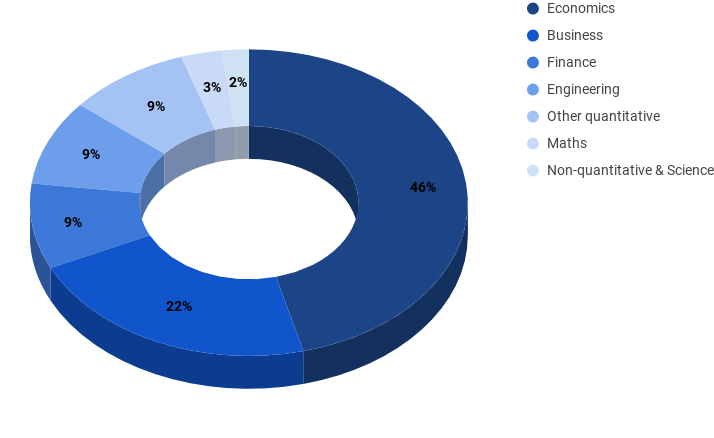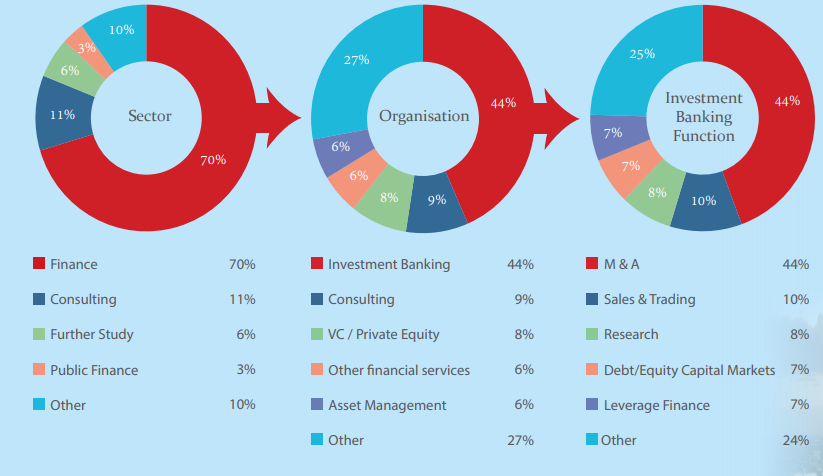LSE MIF
Rankings | Class Profile | Employment Report | Sample Essay | Interview Questions
LSE MIF Introduction
The LSE MIF programme is one of the world’s leading generalist finance master’s degrees, ideal for those whose career objectives lie broadly within the financial services sector. The LSE MSc Finance programme is of 10 months & offers high-level graduates, whose backgrounds may not necessarily be in finance, a unique opportunity to gain a comprehensive foundation and subsequent depth in the field. LSE MIF Class Profile brings together diverse students with different goals in its portfolio. One of the most sought after degrees at the London School of Economics, the programme attracts some of the very best students from leading institutions around the world. Scroll down for further information on LSE MIF Average GMAT, LSE Mif Class Profile, LSE MIF Application Process, employment report, LSE Mif fees, and more.
You will gain an in-depth grounding with core courses in corporate finance and financial markets, before tailoring the degree to your goals with a range of optional courses, including a number of specifically designed applied courses. You will have the opportunity to gain deeper practical insight and links to the City and will benefit from close interaction with LSE’s Financial Markets Group and the Systemic Risk Centre, which attracts leading finance researchers from across the world to their numerous research seminars and conferences. You will also have the opportunity to meet and network with the MSc Finance (part-time) students throughout the year. The programme enjoys an excellent reputation amongst employers, with alumni working in a range of organizations including leading investment banks, financial institutions, consultancies, and boutique firms.
WHO IS IT FOR?
LSE Master in Finance programme is for people who are coolheaded, precise thinkers with a talent for numbers, a passion for finding the right answers and a desire to launch a career in finance.
WHAT WILL YOU LEARN?
LSE MSc Finance will help you to master fundamental tools and concepts and develop a broad, international perspective on competitive capital markets. You’ll learn how successful companies connect finance and strategy, and hone your ability to make decisions.
WHERE WILL IT TAKE YOU?
Common new graduate roles for the LSE MIF class profile include:
Financial services (investment banks, hedge funds, regulatory agencies), Consulting, Fintech, Or financial and management position including Services,
| Program Starts | September 2020 |
| Duration | 10 Months |
| Location | London, United Kingdom |
| Intake 2020 | 1 |
| QS World Global MIF 2020 Ranking | #8 |
| LSE MIF Fees | UK/EU students: £36,984 Overseas students: £36,984 |
| LSE MIF Application Deadlines | Rolling admissions (For intermediate deadlines see application deadline section) |
| LSE MIF Application Process | . GMAT/GRE score · Two letters of recommendation · English language proficiency test report (IELTS/TOEFL) . CV (For more details see application process section) |
All registered students will attend a full-time three-week pre-sessional programme starting in early September. The essential pre-sessional course consists of preparatory academic classes, the Professional Development Programme, and social events. Pre-sessional academic classes cover revision and introduction to core quantitative mathematics, statistics and interpreting financial statements, ensuring all students are able to tackle the material in the first term’s core courses.
- Corporate finance
- Assets markets
- Fixed Income Securities and Credit Markets
- Topics in Portfolio Management
- Mergers, Buyouts and Corporate Restructurings
- Financial Engineering
- Corporate Investment and Financial Policy
- Financial Engineering
LSE MIF Rankings
| Nationalities | 30 |
| Female | 33% |
LSE MIF Students Academic Backgrounds
| Undergraduate Sector | Percentage |
|---|---|
| Economics | 46% |
| Business | 22% |
| Finance | 9% |
| Engineering | 9% |
| Other quantitative | 9% |
| Maths | 3% |
| Non-quantitative & Science | 2% |
LSE MIF Placements
LSE Master in Finance Placements Facts
- Top employers: JP Morgan, Goldman Sachs, Barclays Plc, Morgan Stanley, Citi Deutsche Bank, CITIC
- Top locations of jobs: London 52%, Shanghai 6%, Beijing 5%, Hong Kong 4%, Frankfurt 3%, Pairs 2%
LSE Alumni Info
Students will join a life-long network of LSE alumni who are leaders, thinkers and experts in their chosen fields. The Department of Finance has an active and influential alumni community of over 3,000 individuals, which will benefit students. LSE organise regular networking events for its alumni, both at LSE and in the city of London. As alumni you are invited to take part on alumni panels, attend talks, give presentations, and even mentor current students. We also hold a bi-annual Alumni Conference.
LSE MIF Application Process Deadline
Rolling Admissions
Eligibility
- To be considered for admission to a taught master’s programme,LSE require a bachelor’s degree awarded after a minimum of three years of study with a Cumulative Grade Point Average (CGPA) of 3.3/4, 5/7, 6/8, 7/9 or 7.5/10. Where there is only a percentage grade available, LSE require 65 per cent.
- GMAT/GRE
- IELTS overall score 7
- TOEFL overall score 100
Application Documents
- Online application form
- Two academic references
- All official transcripts and degree certificates
- Statement of academic purpose
- CV
- GRE/GMAT score report
LSE MIF FEES
The LSE MSc Finance programme fees:
- UK/EU students: £36,984
- Overseas students: £36,984
To secure a place on the programme offer holders will be required to pay a deposit of £3,500 within four weeks of receiving their offer. LSE broadly estimates that students should allow £1,100-£1,300 per month for all living expenses, including accommodation, travel, food, laundry, study costs, and other personal expenses. This will vary depending on your lifestyle and requirements.
LSE MIF Funding
LSE Scholarships
- LSE makes available £3.2 million annually in the form of awards from the Graduate Support Scheme (GSS) for students applying for diploma and taught master’s programmes.
- Eligibility: This scheme is open to all applicants for diploma and taught master’s study, with the exception of those undertaking specific modular or executive programmes such as the MSc Finance (Part time), the MSc Health Economics, Policy and Management and the MSc International Strategy and Diplomacy. Double degree students are also eligible for the GSS for their time at LSE – please refer to the information in the ‘GSS for double degree programmes’ section.
- Value: The value of GSS awards ranges from £5,000 to £15,000, depending on financial need.
- Outcomes: If you are offered a GSS award, you will not normally be considered for any further funding from LSE, as a GSS award will cover 100% of your funding shortfall as calculated by the Graduate Financial Support application.
- Eligibility: The scholarships will be offered to an applicant studying either LSE MSc Finance (Full Time) or MSc Finance and Private Equity.
- Value: The scholarships will vary in amount and will be put towards the tuition fees in the first instance.
- How to Apply: The Department will select candidates on a rolling basis and will consider academic merit and financial need.
LSE Master in Finance Sample Essays
Coming soon.




